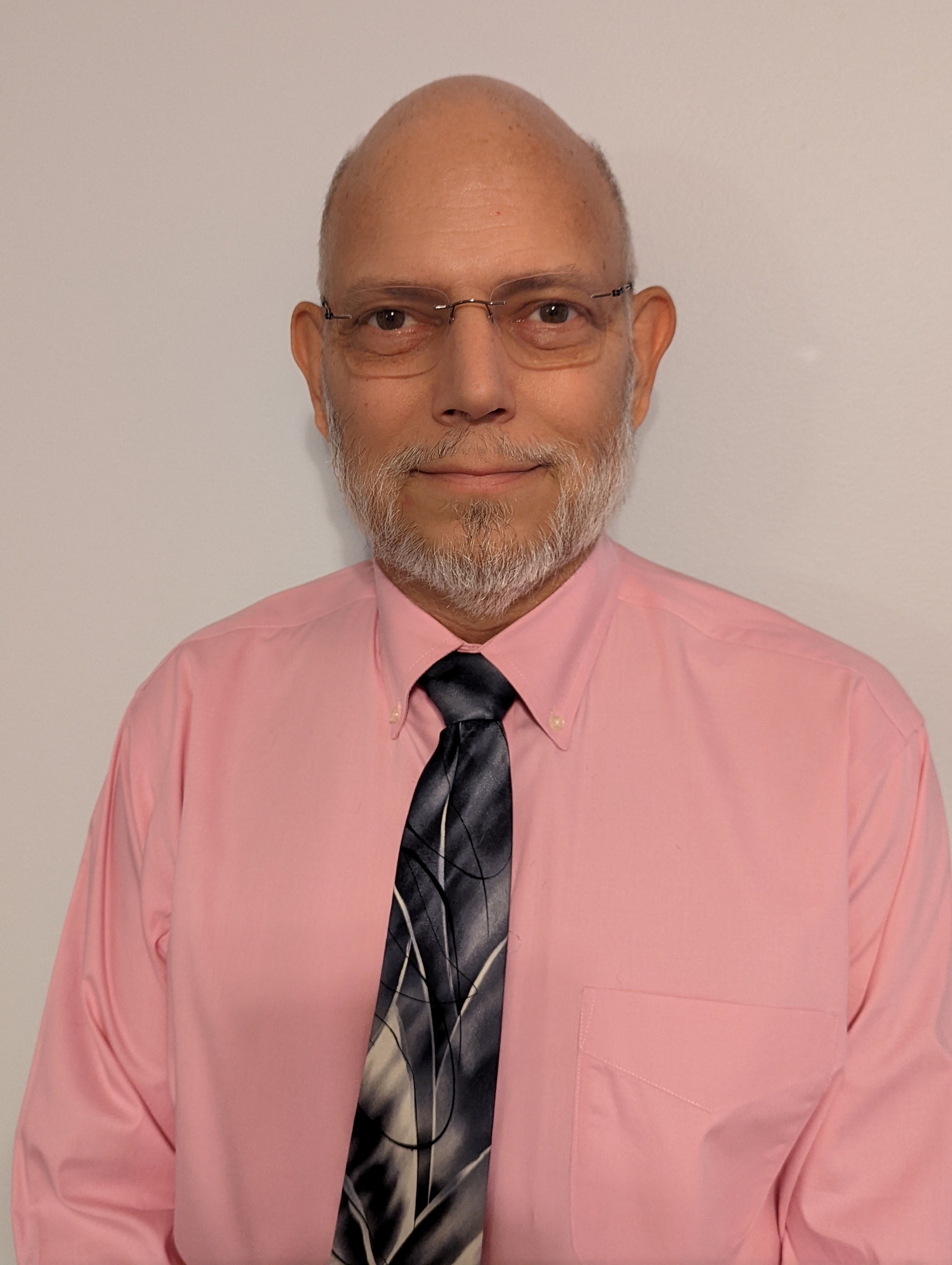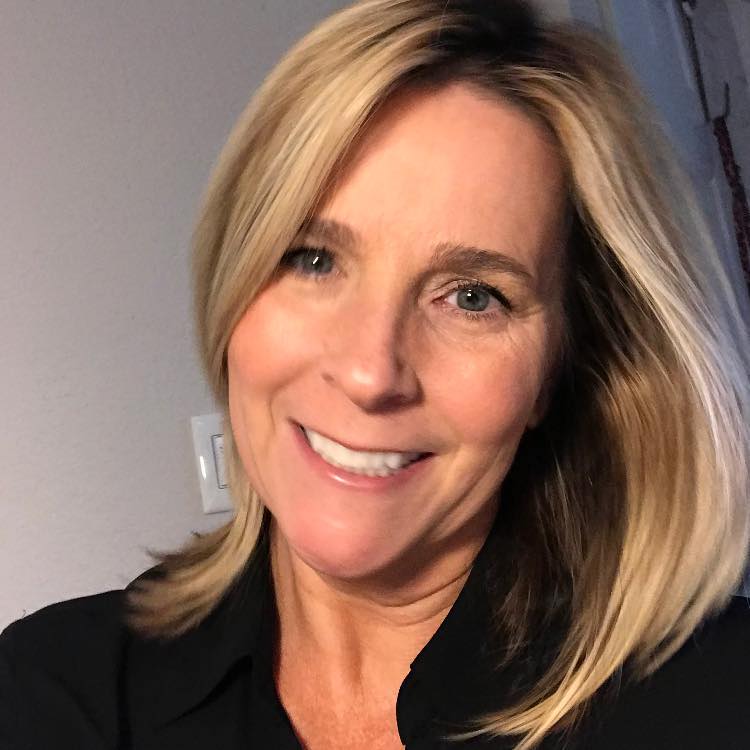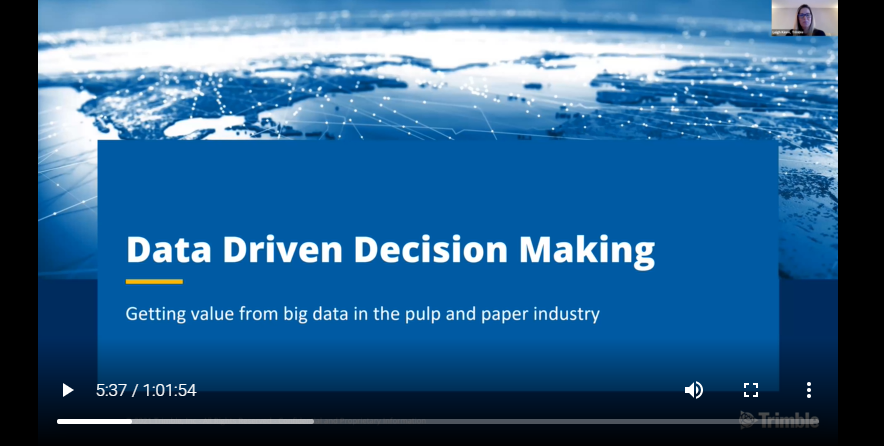 Data-Driven Decision Making with Process Analytics - Making sense of big data in the pulp and paper industry
Data-Driven Decision Making with Process Analytics - Making sense of big data in the pulp and paper industry
This webinar aims to establish best practices for data-driven decision-making in the pulp and paper industry. Industry expert Dr. Peter Hart will guide us through managing data assets, classification, and organization and teach us how to derive value from big data for problem-solving, process improvement, chemical usage, and efficiency, to name a few. We will discuss analysis methods and examine case examples from the industry textbook Peter Hart is editing.
This webinar is specific to the pulp and paper industry and will benefit anyone interested in impacting process efficiency and data analytics.
We will explore how Trimble's Wedge data-mining software improves industrial plant efficiency by digesting process data from multiple sources for analysis and diagnosis to uncover and suggest root causes and consequences of process events before they escalate into big problems.
This webinar provides considerations for how organizations can address the challenges that come from data management, particularly when it comes to:
- Managing big data through structure and standardization for all levels of captured data from enterprise, manufacturing, and operations to automation.
- Making decisions based on actual data and facts rather than theories.
- Unifying communication between teams working with different tools and languages
- Enforcing consistent practices to increase efficiencies and reduce costs.
Who Should Watch:
- Process Engineer
- Continuous improvement
- Sustainability
- Technical manager
- Mill manager
- Green belt, black belt
- Student
Learning Outcomes:
- Understand how to derive value from data analytics for process improvement
- Apply the best practices for analytics efficiency
Sponsored By:
Speakers: Peter Hart and Leigh Kinne
 Peter currently works as Director: Research and Innovation for WestRock. He has been employed with WestRock for 29 years in various research, production and engineering positions of increasing responsibility. Peter worked in production at both the Wickliffe, KY, and Evadale, TX, mills and spent five years living in Brazil halftime as part of a major mill expansion project which included a new paper machine and a serial #1 patented pulping line which he helped develop.
Peter currently works as Director: Research and Innovation for WestRock. He has been employed with WestRock for 29 years in various research, production and engineering positions of increasing responsibility. Peter worked in production at both the Wickliffe, KY, and Evadale, TX, mills and spent five years living in Brazil halftime as part of a major mill expansion project which included a new paper machine and a serial #1 patented pulping line which he helped develop.
Peter was born and raised in northern New Hampshire and graduated from Colebrook Academy. From there he attended the University of Maine for a double major Bachelor of Science in chemical engineering and pulp and paper technology which he obtained with highest honors and distinction. Peter also obtained a Master’s of Science in chemical engineering from the University of Maine. After receiving the Master’s, Peter worked for the University of Maine and assisted with the relocation of the pilot paper machine to Jenness Hall and on various soft money projects. He moved to Atlanta, GA, to get a Ph.D. in chemical engineering from the Georgia Institute of Technology. His dissertation was on the formation and release of AOX during kraft pulp bleaching.
Upon completion of his Ph.D., Peter joined Westvaco (later MeadWestvaco, MWV, and WestRock) as a research chemical engineer and worked on various optimization, cost reduction, and cluster rule compliance projects. He also worked on batch digester over-pressurization issues and fundamental understanding projects along with several material and energy balance models of various mills. From there he moved into production with different positions including pulp mill superintendent, process engineering manager, and technical assistant to the mill manager. Peter rejoined R&D in 2002 working on multiple mill improvement efforts. In this role, he collaborated with multiple vendors, universities, outside research consortia, and government agencies. He became an individual contributor for several years until he was chosen to help lead the corporate R&D structure for the company.
Peter has published more than 100 peer reviewed technical articles and edited and co-wrote three textbooks for TAPPI. He has been a TAPPI member since 1981 and served in leadership roles at both the University of Maine and Georgia Tech. He has been in the leadership ranks of both Southeastern and Gulf Coast Local Sections and served as chair of the Alkaline Pulping and Bleaching Committee and the Pulp Manufacturing Division. Peter has served two terms as editor in chief for TAPPI Journal (TJ) and one term as assistant editor. He has served on the TJ editorial board for about 20 years. Peter has also served on the TAPPI board of directors.
 Leigh Kinne has been the Regional Sales Manager for Trimble Forestry for a year, specializing in industrial data analytics. She has an MBA in management and leadership, and a dual Bachelor's in Humanities and Mass Communications. She has more than 20 years of experience working in the technology sector, providing business solutions from SaaS, ERP, Networking and Telecommunications.
Leigh Kinne has been the Regional Sales Manager for Trimble Forestry for a year, specializing in industrial data analytics. She has an MBA in management and leadership, and a dual Bachelor's in Humanities and Mass Communications. She has more than 20 years of experience working in the technology sector, providing business solutions from SaaS, ERP, Networking and Telecommunications.
Inside this Section
- TAPPISAFE
-
- Assessing Dryer Performance Using TAPPI TIPs - II
- Biomaterials and Bioethanol from Lignocelluloses
- Grade Change Transition Performance and Troubleshooting
- Understanding Bulk & Surface Properties of Complex Solid-State Materials Through Vapor Sorption Techniques
- Enhancing and Expanding Wastewater Treatment at Pulp and Paper Mills Webinar
- Exploiting CNF Water Interactions in new Applications
- TAPPI NANO Webinar Series - Wood Nanoscience and Nanotechnologies
- The Promise of AI Versus the Reality of AI Today
- Chest and Tank Cleaning Tune-Up in the Pulp & Paper Industry
- Insight into Lignin-Based Materials Webinar
- Nano Webinar: Protein Amyloid Fibers and Interactions with Nanocellulose
- Increasing MTBR for CI0₂ Applications in the Pulp & Paper Industry
- How Deep Learning is Used to Determine Woodyard Chip Size Webinar
- Cellulose Nanocrystals in Cementitious Systems – Pilot and Commercial Scale
- Production and application of micro-fibrillated cellulose for paper and board
- Progress Of Nanocellulose And Its Application In China Webinar
- Improving Cross Direction Mapping Webinar
- SCOPE: How to establish and control a successful project
- Nanotechnologies to Advance the Carbohydrate-based Society
- Why Inline Color Measurement is Critical for Paper Manufacturers
- Increase Process Uptime and Efficiency with Power Ultrasound Technology
- Circular Packaging Products from Polysaccharides
- Innovating Renewable Materials for the Future
- Benefits of Duplex Stainless Steel for the Pulp and Paper Industry
- Nanocellulose Sustainable Isolation and Advanced Applications
- Total Pulp and Paper Mill Energy Evaluations
- Integrated Plant and Personnel Safety Solutions for Pulp and Paper Mills, Converting, Printing and Packaging
- The Evolution of Reel Statistical Methods
- Paper Machine Conversions – Feasibility and Conceptual Engineering Phases
- Packaging Solutions: A Conversion Checklist – Technical Considerations for Conversion to Packaging Grades
- How to Keep Advanced Process Controls (APCs) operational longer than 24-months
- Papermaking Industry 4.0: How to Get More Insight from the Data You Already Have
- Troubleshooting Fluid Sealing in Pump Systems for Safety and Reliability
- Data Governance as the Backbone for Data Value
- Paper Machine Water Efficiency
- Improve efficiency with a water management model that maximizes asset utilization
- Coating and Graphic Arts Virtual Event
- Making the Most of Every Fiber
- The Future of Manufacturing Execution Systems: Towards Autonomous Mills
- Current activities in measuring size distributions of Cellulose Nanomaterials
- How to make sure your process improvement project lives on
- Energy Savings & Runtime Extension Strategies For Recovery Boilers
- Papermaking with nonwood fibers
- At the Heart of the Pandemic Response: An Overview of Meltblown Mediafor PPE
- The Benefits of a Risk-based Pressure Vessel and Storage Tank Inspection Program
- Sustainable Fibers for Nonwovens
- Flash Mixing Wet End Additives
- The Science Behind Energy Efficient Homes
- Do We Need an Industry 4.0 Lexicon?
- Personnel Protection Using Textile Substrates Webinar
- Best Practices for Building Ventilation Improvements and Efficiency
- Thermocompressor Applications in Paper Drying (TIP 0404-66)
- Time Management: Smart Techniques That Help You Become More Efficient
- Unconscious Mistakes Women Make That Sabotage Their Careers
- Work – Life Balance: Elusive Dream or Achievable Goal
- Labeling Strategies for Cellulosic Materials
- Moving Past Generational Differences
- Monitoring Tools and Strategies for the Detection and Control of Microbial Growth in Papermaking Systems
- Modern Hydraulic Headboxes - Managing Expectations and Operations
- Microbially Influenced Corrosion
- Microbial Control Protecting Mineral Slurries and Papermaking Additives from Spoilage
- Machine Thermal Sprayed Yankee Dryer Coatings
- Introduction to Tissue Creping and Creping Chemistry
- Introduction to Nonwovens Processes Part I
- Introduction to Nonwovens Processes Part 2
- Increasing Paper Machine Agility with a Novel Grade Change Concept
- Improving Sustainability with QCS Life Cycle Management
- How to Deal with Misleading Environmental Claims Related to Print and Paper
- Evaluation of LLDPE Sealants and Structures for Ultrasonic Sealing
- Transforming Cellulose Nanocrystals into Sustainable Products through Surface Engineering
- Tissue Softness Explained
- Spray Nozzle Basics for Papermaking
- Preventing Dissolving Tank Explosions
- Paper Quality Measurement – Past, Present and Future
- Paper Machine Vacuum Systems
- Nanotechnology in Fibrous Materials: 101
- Nanocellulose: The Road to Commercialization - Opportunities and Recommendations for Researchers, Producers, and End Users
- It is not a question of IF: Digital Printing for Corrugated Packaging Part II
- It is not a question of IF: Digital Printing for Corrugated Packaging
- Introduction to Emulsion Polymers
- How to Use Rheology to Characterize and Formulate Nanofiber Based Materials
- High performance cement via cellulose nanocrystal addition
- How to Specify Showers and Nozzles to Maximize Productivity
- Flame Retardant Formulations, Testing and Environmental Concerns
- Cellulose Nanomaterials: Measurement Needs and Potential Solutions
- Biofilm Control in Papermaking Webinar
- An Overview of Principled Centered Safety
- Drying and Profiling Efficiency of Steam Profilers
- Corona and Plasma Surface Treatments The Opportunities
- Combat Process Disturbances and PID Loop Interactions
- Boost Mill Wide Productivity with a Common Language Approach
- Biocides in White Water Systems Maximizing System Performance While Minimizing Costs
- Binders - Latex Butadiene-Based Latex Binders
- BEAM-- A Model to Assess Biomass Energy Availability Transport Options and Delivery Costs
- Process Foam What Why and How to Attack
- Paper Machine Centrifugal Cleaner Systems A Brief Tutorial
- Nanocellulose based materials for barrier and antibacterial packages
- Microbes in Fresh and Recycled Water Systems
- Overview, Properties and Opportunities for Nanocellulose
- Nanocellulose in the Formulation of Emulsions and Formulation-Composition Maps
- Microbes in Papermaking: Do You Have a Problem
- Improving Winder Safety
- Cellulose Nanomaterial Commercialization: an End User Perspective
- Better Mill Decisions Through Detailed Grade Cost Analysis
- Basics of Refining
- Advanced Online Process Analyzers for Pulp Mill Control
- A Comparison of the FSC and SFI Forest Certification Standards
- Modern Energy Strategy for Paper and Pulp Businesses - Securing a Prosperous Future
- Science, Politics and the Ever-Changing Workplace Regulation of COVID-19
- Understanding Wireless in Process Manufacturing
- Power of spectroscopy for chemical recovery and stickies monitoring Webinar
- Four Ways Packaging Manufacturers Use IIoT to Solve Their Biggest Challenges Webinar
- HCl Gas: A Versatile Catalyst for Retrieving Nanocellulose and Sugars form Biomass
- Improving Fiber Quality and Reducing Chlorine Use in Paper Repulping. Oxone™- The chlorine-free repulping aid
- The Future of Refining
- Data-Driven Decision Making with Process Analytics - Making sense of big data in the pulp and paper industry
- Transducer Basics - Proximity Probes and Other Sensors Webinar
- MFC Robust Grinding Modules & Wet End Jet Applicator—A Path to Disruptive Advantages from Biomaterials
- Nanocellulose-Mycelium Hybrid Materials Webinar
- Lignocellulose Fractionation For Zero-Waste Biorefinery
- A Foray into Feedforward Control Webinar
- Recent Development In Nanocellulose Researh At RISE
- Approach Flow Screening - Impact on Capacity, Stock Cleanliness, Fiber & Energy Savings and PM Runnability Webinar
- Advanced Inline TDS Measurement Technology for Brown Stock Washing Optimization with Advanced Process Control Webinar
- Are you ready for the next level in quality control? Webinar
- Designing Plant-Based Functional Materials Towards Carbon-Negative Applications Webinar
- Spray Transfer Efficiency Webinar
- Fibenol – Wood Residues into Sustainable Bioproducts Webinar
- YP Open House with Coating & Graphic Arts
- Superior Drying Efficiency in Steel Dryers Concept
- Machine Health for Pulp and Paper
- Molded Pulp, Chemical Aspects Webinar – Part 1: Retention and Uniformity
- Molded Pulp, Chemical Aspects Webinar – Part 2: Fluid holdout (hydrophobic sizing)
- Paper Solutions for Food Packaging Webinar
- Molded Pulp, Chemical Aspects Webinar Part 3: Strength Attributes Webinar
- Molded Pulp, Chemical Aspects Webinar Part 4: Dewatering Challenges & Strategies
- How We Turned a Static Optics FTIR Spectrometer into a Universal Analyzer for Pulping
- Molded Pulp, Chemical Aspects Webinar Part 5: Runnability and Process Efficiency
- Using Industry 4.0 Tools to Maintain Maximum Sheet Consistency Out of the Press Section
- Roll-to-Roll Processing of Nanocellulose into Barrier Coatings Webinar
- Solutions for Bearings in Paper Machines Webinar
- Efficient Production of Bio-Based Ingredients
- Best Practices for Consistency Measurement
- Surface Engineering of Cellulose Nanocrystals for Sustainable Bioproduct Development
- Use AI to Give Junior Operators the Performance of Experienced Staff
- The Likeability Trap Q&A with author Alicia Menendez
- How do I access My eLearning
- Training Catalog
- Paper Machine Operator Training Standard-FREE
- TAPPI Professional Certificates


